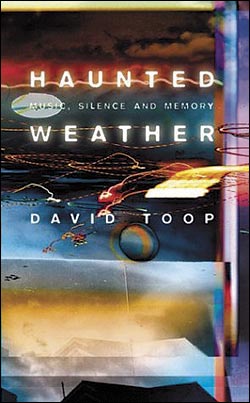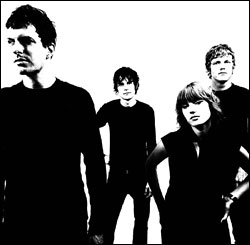Dave Douglas smiles a lot onstage. Not like Al Hirt or Louis Armstrong—while the New York–based trumpeter and composer performs for the audience, he insists on maintaining intimate telepathic contact with collaborators while playing. His is an eye contact–intensive, “now that we’ve created an amusing situation, let’s up the ante” look, not unlike the one Mickey Rourke’s character in 9 1/2 Weeks favors, but gentler and less intimidating.
I can almost feel the gleam in his eye over the phone. “Roscoe Arbuckle liked to have a good time,” Douglas explains from his home. “Calling him a libertine might be a bit extravagant, I think. But what do I know? I’m a musician. I know that’s a cop-out, but I don’t really mean it, anyway. You look at the president, and you have to ask yourself, ‘What’s going on with this country?’ Still, I’m the wrong person to ask. But I’m wise enough to know that I’m the wrong person to ask.”
Right or otherwise, Douglas’ interest in Arbuckle is anything but casual. Keystone, newly released on Douglas’ Greenleaf label, celebrates the actor and director (better known by his nickname, Fatty) via compact disc and DVD, offering the 1916 two-reeler Fatty and Mabel Adrift in its entirety on the latter, along with a short edit of Fatty’s Tintype Tangle titled “Just Another Murder.” The CD includes the aforementioned soundtrack material, plus additional Arbuckle accompaniment.
The silent soundtrack is a natural gambit for the composer, who over the course of 23 releases as a soloist and leader (and even more in collaboration with artists ranging from John Zorn to Cibo Matto) has resolutely avoided redundancy. Given the appetite for social justice that first manifested on 2001’s magisterial Witness, Arbuckle makes perfect sense as well. Wrongly accused of a heinous murder, hounded by an overzealous prosecutor, smeared by rapacious media, career demolished—sheesh, you’d think the silent star was Michael Jackson, were it not for the fact that it took three trials for Arbuckle to be completely exonerated and that the fiasco happened more than 80 years ago.
Clearly, Douglas has found a torch worthy of his nimble fingers—a couple, actually. “There are two things that people think about Roscoe Arbuckle, assuming they know who he is,” says Douglas. “One is that he committed that awful crime, which we know isn’t true. The other is that Fatty Arbuckle is associated with this kind of nasty slapstick—hitting and punching and throwing pies in people’s faces. He’s the big, fat guy who antedated Laurel and Hardy and the Three Stooges. I don’t think that’s a fair appraisal at all. Look at Fatty and Mabel Adrift. Sure, it’s funny. It’s silly. There are gags. But it’s also very sweet and romantic. Plus, much of the humor is very subtle, very stealthy, very intelligent.”
And very naughty. Sly visual double entendres abound throughout the story of Fatty, a farmhand, his rustic sweetie, Mabel Normand, and Teddy the Keystone Dog as they overcome adversity and the machinations of villain Al St. John to come out high, dry, and huggy. Roscoe spanks Teddy; Mabel cranks a calf’s tail; Fatty tries to milk a stallion; St. John’s furtive attempt to seduce Mabel with half an apple ends with him leaping out of the very haystack where Fatty paddled the pooch minutes earlier, a pitchfork sticking out of his ass.
From opening-credit-framing urban nocturne “Sapphire Sky Blue” to Teddy-driven climax and celebratory closer “Tragicomique,” Douglas, saxophonist Marcus Strickland, pianist (Wurlitzer) Jamie Saft, and bassist Brad Jones hew to strict pan-everything values, while drummer Gene Lake favors breakbeats, as well as the John Bonham–esque big-rock gestures he deploys gracefully and guiltlessly on the slow jam “Mabel Normand.” One of the most cogent turntablist sidepersons in the racket (along with Marina Rosenfeld), DJ Olive adds punctuation and panache in doses doled out with so much guile, you often notice them only after they’ve passed. Keystone (also the handle of the sextet playing the score as well as producer Mack Sennet’s film company) skews triumphantly contempo throughout—to the extent that Douglas’ score would work just as well with Hugh Hefner XI Meets the Ultra-Ho’s From Altair B or a Paul Schrader–directed Kojak treatment, were it not for the composer’s subtle sense of sync.
“To my mind,” says Douglas, “the thing that works least with silent films is trying to create something that sounds like an old score. It’s like, c’mon—use your imagination. Plus I found that Roscoe Arbuckle’s films were fast-paced enough to work with a contemporary treatment. Also, I didn’t want to do the kind of soundtrack that was going to illustrate every little gesture in the film. I don’t like scores with snare hits whenever someone knocks on a door, that sort of thing. Fatty and Mabel was made as a silent film; the textures and plotline are extremely clear. They don’t need any additional illustration. What the film needed was counterpoint, an emotional undercurrent. That’s what I tried to write.”
Dave Douglas and Keystone play the Triple Door at 7 p.m. and 9: 30 p.m. Mon., Oct. 24. Part of the Earshot Jazz Festival. $18 Earshot members/$20.








